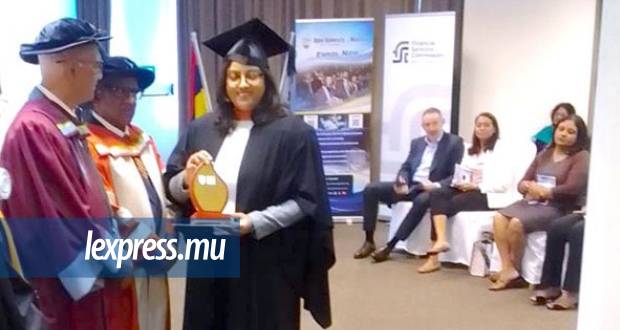Publicité
Elizabeth Dietrichsen: “Australia is quite risk averse and Mauritius is close to a lot of high-risk markets on the African continent.”
Par
Partager cet article
Elizabeth Dietrichsen: “Australia is quite risk averse and Mauritius is close to a lot of high-risk markets on the African continent.”


This week we speak with Elizabeth Dietrichsen, business development manager at the Australian Trade and Investment Commission about studying in Australia as well as why the land down under is so wary about signing a trade pact that Mauritius is keen about signing.
What sets Australia apart from other study destinations?
The university space in Mauritius is a very competitive space. At many of the events that we attended, we had the presence of other good and highly reputable educational destinations as well. What sets Australia apart is the high standard of tuition, the high level of diversity on campuses, so it offers a very well-rounded study experience. Students who study in Australia don’t only go for academic studies, but make friends across the world. It is easier to live there and the climate is easier to adapt to than in some other destinations in the world. And then there is the language. Australia is multi-cultural, but everybody gets by with good English. There are big diaspora populations, so Mauritian students will never feel lost and alone.
Emigration is a big consideration when it comes to deciding to study in Australia, but we are hearing some anti-immigrant sentiment in Australia recently. What would you tell a Mauritian student who is apprehensive about that?
The question is whether you are going there to study or to emigrate. Having a post-study work visa provides students with that moment of time, between 18 months and two years, where they can find a job that would be good enough for them, or they can decide whether life there is good enough for them and then follow a legal way to gain and opportunity to work and stay. Anti-immigrant sentiments come and go and most campuses are safe. There are isolated incidents in certain parts but they are quite limited, that’s definitely not the norm. We take it seriously that international students are safe and have a good experience.
I would also like to talk about trade more generally, since you are from the Australian trade commission. Mauritius wants to position itself as a hub for business between Africa and other countries such as Australia. But in recent years, we have seen trade between Australia and Africa declining. Why is that happening?
The most obvious answer would be that the cost of bringing goods to Africa is a bit of a challenge for Australia. And then there is the question of infrastructural challenges, for example ports, which are not good in many places. And Africa has traditionally had strong linkages with former colonial partners, and that has positioned those partners in a very good way to access those markets. In many instances, you would have free trade agreements, preferential trade agreements, for example, to have French cheese in supermarkets in West Africa. So those things give an advantage to Australia’s competitors. There is also the fact that Australia is close to China and a lot of Australian exports are going towards China, but that does not mean that Africa is ignored. That means that we will have to try harder for excellent Australian produce to get access to African markets as much as possible.
One of the major complaints amongst business lobbies here is that Mauritius does not figure very highly as a potential trading partner in Australia. What can we do to change that perception?
There is a perception in Australia of Mauritius as a holiday destination only. However, organisations like the Economic Development Board and the Mauritius Chamber of Commerce and Industry and the newly-established Aus-cham want to promote Mauritius as a business, and not just a tourist destination. When Australian businesses come here, they will find excellent infrastructure, an excellent banking and finance centre and commercial opportunities. And we will work with that. We believe that by creating people-to-people linkages, business linkages will follow from there. The way that Mauritius is going about positioning itself as a hub goes both ways and is a good way to go about changing the perception that it’s not just a holiday destination. Increasingly, flights will be coming to Mauritius and that will help create more awareness of the opportunities.
Why would Australia need to go through Mauritius? After all, its trade with South Africa completely overshadows its trade with Mauritius. It’s already doing a lot of business there, so why do they need Mauritius?
Mauritius is the highest ranked ease of doing business country in the region in terms of setting up and running a business, finding and engaging skilled labour. Those things are very much an advantage that Mauritius has over South Africa. The fact that Mauritius is a very liberal market sets it apart. You can do business here without having to bribe your way through a massive bureaucracy as you may have to do in other countries. Mauritius is part of the region so it has a doorway in and relationships with African states that Australia can benefit from.
During your stay here you must have met government officials as well. Mauritius has long wanted to sign a comprehensive economic and trade agreement with Australia. As recently as August 2018, our deputy prime minister on a visit to Australia also brought this up. What’s holding it up?
That’s a difficult question. Australia is quite wary of signing bilateral agreements that they cannot sustain, that’s why there is no rush to sign up something that won’t necessarily be in the interests of both parties. And its effects on the broader region must also be taken into account. Australia does not limit its relationships to those agreements, we feel that such agreements do help in encouraging business bilaterally, but we do not want to be bound by those agreements. We do not sign agreements first and then wait for business to follow. We prefer for businesses to come here and be set up and then that could be an opening to open up negotiations for such an agreement. Australia has signed a small number of such agreements globally, there are very few partners that we have signed such comprehensive agreements with. They normally take a long time to conclude, usually five or 10 years at least. For Australia, as long as states play by the rules of the World Trade Organisation, that’s what they are looking for, and anything closer will take time.
So Mauritius is not big enough for a trade pact?
Australia is quite risk averse and Mauritius is close to a lot of high-risk markets on the African continent. So we cannot rush into anything. But broadly speaking, Australian businesses do business in places where they can make money and Mauritius is a relatively small market. It’s pretty niche for a number of products such as wine, high-end clothing or luxury items. As time goes by and Mauritian and Australian businesses get to know each other better, there will be opportunities in retail for example, where Mauritian businesses would want to increase imports from Australia and there are other trends globally such as organic or bio produce, fruits vegetables and meats. And education is also a part of that, with Australian education increasingly becoming available in Mauritius as well. Fundamentally, bilateral trade agreements are not high on the agenda with anyone. Even the agreement with South Africa dates back quite a long time.
You have told me the good stuff, but what are some of the criticisms that you get from Australian businesses already here in Mauritius?
(Laughs) Well, there is more scope for environmental awareness, water distribution and managing the ocean, which is the same issue that faces Australia as well, such as protecting the coral reefs for one. Australia is also working with Mauritians on health issues, such as diabetes and upgrading medical facilities so medical care does not have to go overseas. I would like to point one example, Edith Cowan University in Australia has sent some nurses to Mauritius and Rodrigues and are doing workshops at the Jeetoo hospital for nurses. That would increase the local levels of nursing. Another issue is that despite Mauritius being ranked highly when it comes to ease of doing business, one recurring comment I have been given is that productivity can be higher. I cannot comment on that because since I have been here I have found everyone helpful and accommodating. Infrastructure is also an issue, but that is changing too; there is the metro express which I am told will ease the traffic which is another complaint that everyone has. Overall, from what Australian businesses here have told me, it’s a soft entry, especially if you have to compare it to some African countries.
For more views and in-depth analysis of current issues, Weekly magazine (Price: Rs 25) or subscribe to Weekly for Rs110 a month. (Free delivery to your doorstep). Email us on: weekly@lexpress.mu
Publicité
Les plus récents






